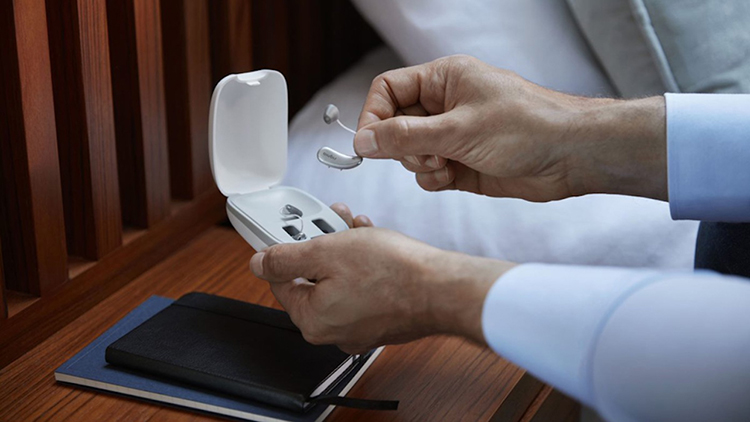
Privacy statement: Your privacy is very important to Us. Our company promises not to disclose your personal information to any external company with out your explicit permission.
As the technology improves, Rechargeable hearing aids are quickly becoming the more popular option for many people. However, some people may prefer hearing aids with disposable batteries, depending on their circumstances.

1. One battery for the life of your hearing aid
Lithium-ion battery technology means hearing aids can now keep going for up to 30 hours and last about five years before they have to be replaced.
This is an enormous improvement compared to earlier rechargeable battery systems. Rechargeable Nickel metal hydride batteries have been used in past iterations of hearing aids and tended to last only about a year. The very first rechargeable battery solution for hearing aids were silver metal zinc based, and they lasted only six months. While Z power rechargeable devices are still available, even they have improved their lifespan to 12-16 months before needing to be replaced.
2. They`re more durable
Rechargeable means no or less opening and closing of battery doors. With many rechargeable options being unibody, meaning no battery door at all, there is less place for moisture, dust, and debris to corrupt the components of the hearing aid. Our office has seen a significant drop in hearing aid repairs with rechargeable styles of hearing aids.
3. You won`t be caught high and dry
You are less likely to be disrupted from your daily habits. This is the same reason that you never wake up with a phone out of battery, because you are used to plugging it in every night.
Rechargeable hearing aids operate in the same manner. You need not worry about a dead battery the following day if you put them into the charger before going to bed. If you are still dependent on disposable batteries, you could be left without hearing aids if you do not carry backup batteries. A concern we hear sometimes is: [What if I forget to charge or am without a power source for a few days?" Don`t worry, just like most electronics there are portable charging options that will allow you to recharge without a direct power source.
4. Better for the environment
With lithium-ion batteries, there is no need to throw out batteries every week. This reduces the chances of pets or small children coming into contact with the tiny batteries, and it is one less thing to add to your monthly list of errands. Furthermore, by reducing waste, you`re doing a small part in ensuring that weekly disposable batteries do not make their way to the landfill! You can use rechargeable batteries hundreds of times and still be able to dispose of that one battery in an environmentally friendly way.
5. Less tiny parts
Rechargeable hearing aids are a great option for people who find it hard to manage small devices. Those with arthritis or problems with fine motor skills don`t have to fiddle with the battery door of the hearing aid anymore. Using rechargeable hearing aids, users just remove their auditory instruments and place them in a recharging dock which immediately starts to charge their devices.
6. More power-efficient
If you can`t get enough of wireless streaming using Bluetooth, you stand to benefit the most from rechargeable hearing aids. Bluetooth-streaming is especially draining on disposable batteries for most hearing aids. Lithium-ion batteries can, however, help to resolve this problem. Fully loaded batteries can get you through 19 hours, including 5 hours of streaming whatever content you want, throughout the day. This is a marked improvement on previous battery incarnations. You won`t have to miss streaming your favourite podcast ever again!
Rechargeable hearing aids increasing in popularity
Cross predicts Rechargeable Hearing Aid instruments will become even more commonplace as sound quality, battery efficiency and interchangeability, and cosmetic appeal continue to improve.
[Over 35 years I`ve seen rechargeability come out as a means of drawing people into the hearing aid marketplace," he said. [It resurfaces every seven years or so as something fresh and new and then it goes away. This last wave has become more of a mainstay. The current generation of technology has come close to meeting consumer requests, that`s why I think it`s going to become normalized moving forward."
His patients who wear rechargeable hearing aids [like them and are comfortable with them. They got them for a reason," Cross said. [They were appropriate for them and met the needs that they have."

Privacy statement: Your privacy is very important to Us. Our company promises not to disclose your personal information to any external company with out your explicit permission.

Fill in more information so that we can get in touch with you faster
Privacy statement: Your privacy is very important to Us. Our company promises not to disclose your personal information to any external company with out your explicit permission.